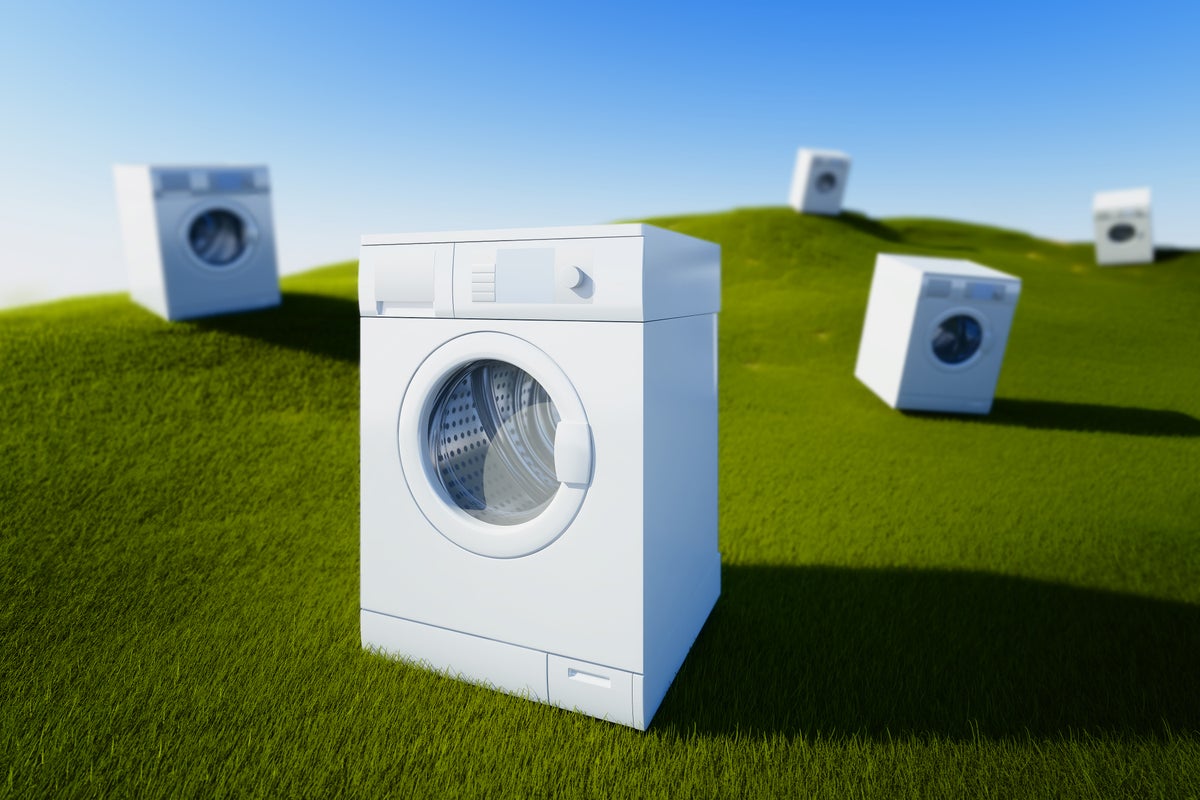Well this mandate all but guarantees no trade deal will be made with the US. The things we do make don’t last long.
The things we do make don’t last long.
I assume you’re from the states? I’ve had my small Made in USA Thermos for 10 years. It’s indestructible.
I could probably think of a few other good and durable things coming from the US - all sorts of guitars, banjos, ukuleles?
I’m being hyperbolic. Ultimately is buying US worth your soul, values/morals, and pride? In the end it’s not worth it.
Do like Dubai (for this instance) and demand better LED bulbs too.
Dude I love Big Clive.
If you read into it, the video is misleading and the bulbs aren’t as good as it claims. They don’t go out but they suck when it comes to the light they produce
That’s too bad, I haven’t kept up with the news I. That I guess. The main problem I saw was that specifically Dubai preferred cold white light, while that should have nothing to do with longevity, the only place I can tolerate that is in my workshop, where I already have LED florescent replacements.
This drives me nuts. I only buy Philips LEDs now since the others only seem to last a year, which is infuriating.
I only use IKEA, and they last forever for me.
That’s weird. I tried IKEA first and they died super quick too. Only thing that makes sense to me is they are somehow overheating which doesn’t make sense since they weren’t fully enclosed and room temp is normal.
Maybe I’ve give them ago again, it was 5+ years ago I tried them.
I’ve been running Tradfri lamps from IKEA for over 5 years now with little issue. But I have them always somewhat dimmed. Not sure if that would make a difference.
My first Led for a regular lamp at home was an Osram for nearly 20€. It died after ca. 3 years. After that Ikea had launched their cheap LEDs and I started buying them. I can’t really say how long each of them lasted, but I moved and started reusing them in different lamps. I guess most of them are over 5 years old by now. Every now and then one of them dies but my subjective feelings is that they offer great value.
As much as I love this, I fail to see how this would be able to be written into law. It’s basically gov mandated warranty period. If the goal is to have manufacturers make products that last, how long is long enough for every product category? What’s to say that they do the same thing and design products that fail right after warranty ends? Who decides if there is foul play in designing faulty products and how? Unless the gov makes their own product that lasts for 20 years and tells every other company to use this as a baseline otherwise get fined, I don’t know how they would be able to enforce this.
I just think this is a big gray area and it would be hard to make this cut and clear. The only thing I think they could do for now is to have companies provide repair manuals and provide parts for a set amount of years after product launch, and repairs should be able to be made by customers themselves without needing to go through 1st party verification like Apple requires with their phones.
Think you answered your own question there.
Mandated warranty periods. Pretty straight forward.
And they currently engineer product to have things fail right after their warranty expires, so, that’s not really a concern, since we’re already living with that.
And they currently engineer product to have things fail right after their warranty expires, so, that’s not really a concern, since we’re already living with the that.
Which is exactly my point of why mandated warranty period does not really fix the core of the problem, which is intentionally making products not last. It’s just a bandaid solution (Yes I know a solution is still better than nothing, and may be the first step to address this issue). What I want to see is prolonging the life of a product by letting consumers freely fix their own stuff (parts, schematics, etc.) without the manufacturer locking things down, even after the warranty expires.
Let’s not let the perfect be the enemy of the good.
Mandated warranty minimums and right to repair regulations are not mutually exclusive. We can do both, even if we don’t do them at the same time.
Agreed
Back to the good old days when products were of higher quality. What a concept.
We have a Bosch washing machine we bought second hand 15 years ago for £50. It’s basic, not digital, but has all the functions we need. We’ve never had a problem with it. It will break one day but I’m hoping it lasts a lot longer still.
Bosch makes good appliances.
I’ve heard this from service techs who have worked on my refrigerator and dishwasher - major appliances in America last a third as long as they did 10 or 15 years ago.
Money burns the world to the ground
And that’s nothing. You know how they’re pushing for washing machines, dishwashers, etc. to be internet connected? Currently they’re forcing this for data mining purposes. But I have no doubt their real goal is to eventually make these devices like printers, with expensive consumables locked in by internet-connected DRM. They’ve already gotten people used to using dish and clothes detergent pods. How long until they’re putting everything in plastic cartridges, locking things down with DRM, and charging like printer companies do?
My washing machine is around 25 years old. Not giving it up till its absolutely done haha. But since parts are relatively available, it might just be a few more years.
The washer, dryer, dishwasher and fridge my wife had when we got married were already old and all lasted 20 years more. The fridge was the first to go, and in the 12 years since then they have all been replaced twice.
I can tell you from firsthand experience it’s even worse than that. I had a washer that lasted me damn near 20 years that was made in the 90s. Finally decided to get a new set from Samsung. Made it just past warranty, or basically 1 year. The repair would have cost as much as the washer was new. Similar experience with an LG fridge. Bought it and the ice machine broke in it, TWICE, within the first year. Fuck these brands and their established hold on the market.
they are truly junk. the only goal of American industry, it seems, is to make more money than ever.
Always has been.
And to a world where repairing is both possible and feasible.
Electronics in general should last longer, just like back in the day.
Plenty of short-lived stuff back then, too. Survivorship bias means that all the stuff that happened to survive to today is not necessarily representative of the typical thing that was manufactured back then.
Well yes it’s ridiculous we have (in EU) a mandatory warranty of only 2 years on anything electronic.
Phones should be 5 years. Appliances should be 10 and cars 15 or 200k kilometers. How have we normalized the fact that it’s okay for a car to break down after two years and the manufacturer is not on the hook ?
Samsung: god damnit, now we have to use the $0.30 washer instead of the $0.29 washer and itll last at least 10 years longer!
That’s 10s of millions in extra sales lost!
A welcome mandate, especially for electronics. However people are already throwing away so much perfectly fine furniture that I don‘t think it will help much in that regard. A lot of people want something new, not something that just works.
Well, for furniture, I totally agree with you and honestly: I don’t think there is eomething wrong with redesigning your living room every 10 years, especially when you move around.
I mainly want to be able to buy old washing machines, dish washers, TVs, because I don’t care about their appearance.
If it’s quality furniture you can sell or donate it. If it’s recent Ikea or other cheap stuff, it won’t survive being disassembled, moved and reassembled. Ikea’s surfaces scratch so easily, even on desks. It’s ridiculous. That kind of fast furniture is terribly unsustainable. But I wouldn’t be bothered if you bought a new sofa every ten years and make someone else happy with a used sofa that will last another ten years in it’s new home.
If the produced stuff last longer it wouldn’t mean there would be less competition on innovation, people would still have a reason to sell you their old appliances because they want certain new function. This law is against making stuff that can’t be repaired or breaks easily. Don’t think you’d buy a 2 year old tv if it doesn’t work, right.
I specifically want new because I already know even the new won’t last long don’t even mind something someone has used for a few years already
Where are you living? Here people give away (emmaus for example) or sell it online, for cheap equals you don’t even need to throw it away, someone comes and picks it up for you.
Those appliances are so simple too, making them durable is very low cost. Good move EU.
Where I live you can easily give your stuff away or donate it to a charity shop, but it’s a tiny bit less effort to chuck it in the trash so there are people who do that. Not all of them, thank god, but you can come across decent stuff every one in a while. Do have to say people are more likely to dump cheap stuff than reliable stuff from known brands.
Yeah they buy new because the advertisements give you idea that new is cool, brainwashing one into consuming. We should ban ads
Disposable culture is a blight on society…
This is absolutely true and sad, though I get a lot of free electronics to dismantle by rummaging through trash. People have no appreciation of the value of “used” items that either work perfectly fine or have a minor issue that prevents them from working but is easily fixable, e.g. a broken cable (I have many working devices that were thrown away because the cable is severed, which I could easily fix). I think only proper education in this regard will improve things long term.
People have been conditioned to throw away perfectly good shit, now we are surprised they throw away shit. This policy is obviously not gonna fix the issue on its own, but as you said, it’s welcome.
The spirit is willing, but the machine is spongy and bruised.
Bullshit. My aunt has a washing machine with all knobs and switches that’s probably 30+ years old and it still works fine.
They need to stop putting all these digital components into washing machines or make the boards standardized so they can be easily swapped out. These aren’t laptops that you toss after 3-5 years. Appliances should last 10-20 years.
Laptops should last longer than 3-5 years too. It should go without saying, but this is the internet.
Agreed but in most larger businesses swap out the laptops around 3-5 years.
Consumers use laptop 5-10+ until they die.
Framework like modular laptop would fix this. Need a new screen? No problem. Need a new processor? No problem.
Upgrade whatever is outdated and just that
Yeah but imagine if we had a laptop motherboard standard like desktops.
Instead of ATX it would be something like MLF - Modular Laptop Framework
Where there would be some board standard for laptop boards.
Then you get screen ribbon standards, keyboard ribbon standards, etc.
This would allow one to order a laptop case with screen, keyboard and touchpad. But you can pick your board, cpu, ram.
I know some companies have done GPU upgrades but how nice would it be to upgrade your 4 year old $3k laptop’s GPU?
The three biggest things that kill a tyre are;
- shitty roads
- aggressive driving
- heavy vehicles (like EVs and oversized SUVs)
That said, cheaper tyres are typically made of cheaper compounds that age poorly.
removed by mod
Not quite, something like 98% of road damage is caused by trucks. Damage increases exponentially with weight.
Passenger cars are getting heavier Light trucks (SUVs) are now being driven in lieu of compact station-wagons.
Vehicle classes are also getting larger and heavier. Subcompacts that used to weigh less than 1000kg are now about 1500kg and EV variants are over 2000kg!
I am talking about 40.000kg trucks. Anything below 3.500kg is basically harmless (in comparison).
It depends on what the roads were built for.
If they are built to handle 1500kg passenger cars, 3500kg behemoth SUVs and Pickups can really do some damage, especially at speed.
I don’t know of any road built for 1.500kg cars. Most are 40t, with some 12t and very few narrow and old ones with 3.5t (and usually have a 30 km/h limit).
Under inflation is terrible for longevity, handling, and safety. You should maintain proper tire pressure.
So is over-inflation. Always inflate to the correct pressure as per the placard. If you are driving in unusual conditions,
My little Jimny weighs bugger-all but needs Light Truck tyres. On-road pressure is a very light 26 PSI. If I am driving through Sand, Mud or Snow I will deflate to an appropriate pressure and drive slowly. If I am driving over rocky terrain, I will also deflate to an appropriate pressure for better adhesion.
As soon as I hit the Tarmac again, I will reinflate back to 26. If I am carrying more weight or towing, I will inflate the rear tyres to 29.
EVs are getting their own lines of tyres (supposedly) designed to handle the weight, torque and address range concerns.
Never buy cheap tires - they are your only contact with the road. You can have the best car in the world, and shitty tires will make it worthless.
There are videos on the subject, making the point of buying good tires, cause they will save your life.
Same goes for wipers.
That last point sticks with me.
I always used to get the cheapest, shittest tyres just because cost, but since I became a driving instructor a few years back I got into the mentality of thinking “I need decent tyres because I don’t want my learners to lose control of the car”
Normally I’d buy tyres once every 6-8 months after squeezing out every morsel of life from them, but my current Bridgestone tyres have been on for nearly a year now - doing driving instructor mileage on top of my usual - and they’re not showing any signs of needing replacing yet.
The fact is I’m actually saving money doing it this way, because whilst the tyres are more expensive, I’m replacing them much less often.
I’m going to try out Pirelli next because it sounds like they’ve started lining the inside of some of their tyres with that puncture repair stuff and padding them out with foam to significantly reduce road noise.
That’s weird. I’m changing tires every 2 to 3 years and so is the norm in Europe.
They did mention being a driving instructor. Driving (and teaching students to drive) all day every day is going to put a lot more wear on the tires than a typical driver.
They also mentioned getting good tires after they started doing that, not before
Yeah I put 30k+ miles on the car just doing instructing, then I often also drive when I go on holiday, putting at least a good 500-600 miles on the car if I go away on the weekend (which is often).
I’ve had dedicated works vehicles which I’ve put fewer miles on the clock 😂
Obligatory Pratchett:
The reason that the rich were so rich, Vimes reasoned, was because they managed to spend less money.
Take boots, for example. He earned thirty-eight dollars a month plus allowances. A really good pair of leather boots cost fifty dollars. But an affordable pair of boots, which were sort of OK for a season or two and then leaked like hell when the cardboard gave out, cost about ten dollars. Those were the kind of boots Vimes always bought, and wore until the soles were so thin that he could tell where he was in Ankh-Morpork on a foggy night by the feel of the cobbles.
But the thing was that good boots lasted for years and years. A man who could afford fifty dollars had a pair of boots that’d still be keeping his feet dry in ten years’ time, while the poor man who could only afford cheap boots would have spent a hundred dollars on boots in the same time and would still have wet feet.
This was the Captain Samuel Vimes ‘Boots’ theory of socioeconomic unfairness.
I’ve carried that with me for years. I always try to buy long-lasting quality items for this very reason.
Not to mention that, due to inflation, those ten dollar boots themselves will cost 20 to 30 dollars before long.
I wonder how this translates to tires. Generally, softer rubber translates to more grip and faster wear, and other way around. Does this mean that the tires will be less grippy then?
Yes. Cue in all the EV eco bullshit tires used on EVs that skid around already in good conditions and are absolutely horrible in bad conditions. All for sake of efficiency.
Idk I had a Tesla M3 with stock tires and because of the center of gravity being so low the car had great grip even with fast sharp corners. Seems like you just hate EV’s for whatever reason and take it out whatever way you can
There are some pretty annoying EVs out there (example bmw i3). It was delightful to drive, but as soon as a single rain droplet fell from the sky, traction control has a lot of hard work
I did drive a VW id.4 but with how high and huge that thing is the handling was horrible. From all the EV’s I’ve been able to drive/sit in the only good ones were currently Tesla and Skoda.
It’s not an EV thing, it’s a carmaker (and car type) thing.
I very much believe EV’s are the future, I just think the EU EV’s have slacked a lot because they were so adamant at staying with fuel based engines and because of that a lot of people think EV’s are so much worse, while the good and decently affordable EV’s sadly come from countries we just don’t really like (US and China)
I only know one electric skoda (Enyaq, the citigo was a fleeting experiment). And the Enyaq is the exact same car as the ID.4 except the interior. Same battery, drive train suspensión, brakes, etc. Same for the Audi Q4. So it seems to me that your subjective feel is not very accurate.
Usually it helps for traction if car weighs 300 tons…
Also no, it’s not me hating on EVs, it’s because Car makers stick lowest rolling resistance tires to improve efficiency and lower rolling resistance also means they grip asphalt poorly.
Mandatory alignment checks?
Isn’t this already a thing in the yearly technical check?
Idk, I’m in the u.s. without any inspections whatsoever. There’s an app that works with newer ios devices that can check very accurately because of the finer tuned gyroscope. Hopefully an android variant comes soon. Then trucks, buses etc. can check every trip without a lot of hastle.
Wait what the fuck, you don’t have yearly technical inspections there? So people can drive whatever deathtraps without functional brakes or shit?
I’d call USA a developing country but that’d imply positive change over time
It depends on the State.
Yeah, it’s kinda bullshit when you see perfectly smooth tires on a grain truck, which also doesn’t require a special license if driven by a farmer or their family. I think you could be 16 or 18 and hop into a truck to haul 20 tons of grain with a car license.
Did not happen here in Finland just a few days ago.
The way I see it, they check mostly for stuff that could result in unsafe breakage/conditions, endangering yourself and others.
Of course misaligned front tires aren’t good even if you ignore tire wear, but they don’t make your car a death trap.
Not saying I’m agreeing with this, just my observation. Some of the things that are important to them, while others aren’t even checked, the logic eludes me.
Maybe. Tire rubber compounds continue to improve, along with construction and tread design. So newer tires might be just as grippy and more efficient. Or way less grippy and way more efficient. Or way grippier and just as efficient. It just depends on the tradeoffs the manufacturer decided to make.
I believe that tires will go a long way in terms of wear and longevity (as we’ve seen in the past 100 years), but not sure if more grip and less rolling resistence (efficiency) is possible.
When buying future appliances, I have to be sure to get them from the EU. Standards in the US are going to be below the floor.
Prepare to pay out the ass for that though. Between tariffs and a weakening dollar.
If you are in the EU yourself it’s not that bad. All my appliances are actually made in Germany, and they were mid-price (BSH and Liebherr, a bit more expensive than chinese/korean but with better efficiency, warranties and reviews).
Why? We don’t buy products like this from the US. If its imported its coming from China.
Quick edit: I clearly misread the comment you replied to
I’m liking the sound of “Made in EU = high quality”
Oh look! So much progress is being made since USA embargoed itself!
I know this is a joke, but it is important to point out for others that such policies get years to be designed, discussed and published in the EU.
And this law came into effect last July
It’s a good thing they think about this. With that said, the tires can wait. Let’s start with the low hanging fruit. It’s a crime that critical components in home appliances break so easily and are so hard to fix.
Or impossible to buy spares for, or when you can get the spare part it’s often so expensive with shipping that it’s almost worth buying a new appliance on offer with the warranty that comes with it.
Exactly this. I recently had my clothes washer break. Spent days researching the problem, taking the thing apart, figuring out the cause was the spindle on the back of the drum having a crack and eventually breaking. I eventually found a replacement part which had a slightly different part number but research showed it should be compatible. $400 for the part. $130 shipping, plus tax came out to just shy of $600. 2 week lead time to get the part, and no certainty I’d be able to put it all back together. Professional appliance repair wouldn’t have made financial sense either, I called around.
I ended up ordering a new one for $800 all in, saving many headaches. Had it two days later and was able to catch up on laundry.
Fundamentally, you’re never going to be able to compete with the economies of scale of an assembly line with the same people putting together all the parts that were shipped to the same place. If the repairman has to keep an inventory of hundreds of parts for dozens of models, and drive around to where he only has time to diagnose and fix 2 appliances per day, while the factory worker can install a part for 100 appliances per day, there will always be a gap between the price of replacement versus the price of repair.
Did you research spare part availability / reparability scores when buying the new one?
I always start with that when buying major items. Some brands are more consumer friendly than others. I was still able to buy replacement parts for my 2005 fridge and dishwasher in 2019 and 2023 for 13 and 100 euros respectively (the 100 euro was a heat exchanger one of the biggest pieces of the machine). With 6 Euro shipping costs, 2 day delivery. And a bunch of YouTube videos to do the repair.
In 2024 we equipped a whole new house with the same brand, voting with our wallets.
Yes, to the best of my ability and available resources. It is a newer model, so currently spare parts seemed to be abundant vs the 12 or so year old previous model.
Nice work on the cheap repairs! Which brand, if I may ask?
Neff, but it’s exactly the same hardware as Bosch and Siemens (BSH).
We sold the apartment with the 20 year old devices still working perfectly.
Cool! Bosch is going to be my next set of appliances after I sell my current place, and my new place needs new ones.
Some stuff are just ridiculously tedious to service due to their design.
Asus laptops are notorious for this. I remember having to take apart everything including the mainboard just to replace the RAM module.
On a similar note, in car context, I’ve read about instances where one needed to take out the whole engine just to replace the spark plug. I think it was Mercedes A series, as well as some Wuling.
Spark plugs hit home. The back 3 in my Lexus are a real pain in the arse to get to. they’re iridium so they dont have to be done as regularly but when they do it’s a good few hours work even for a professional
To be honest anything on a modern engine is impossible, I had headlights that needed part of the bumper and wheel arch removing, just to change a bulb
Tiny plastic part that holds the handle to my fridge broke. Need a new 50 cent plastic part.
GE wants $200 to replace all 3 metal handle assemblies. Can’t just get the plastic part, it comes in a bundle with all 3 metal handles. Which would immediately go in the garbage.
If we can’t get them on the “intentionally gouging customers” angle, we can surely get them on the “creating excess waste” angle.
Find someone with a 3D printer?
This is a good first step. The next would be to lower the ridiculous amount of electronics in them and remove wifi and telemetry functionality. A dish washer should never have to connect to a server to do its job.
I would like it to come with an open source firmware that I could connect to my locally hosted servers.
I would enjoy mapping out load weights, water and electricity consumption, and cross reference that with a lot of other stuff. Plus some remote controls, and a better interface to choosing washing programs and scheduling start/end…
I just don’t want any of that data to leave my house, ever.
Exactly this. Wifi is awesome. Some opaque server on the internet is not. Let me home assistant the shit out that load of dishes.
And have an easily accessed setting to turn it all off if you don’t want it. I’d even be okay with a physical switch. The short answere is, your appliance should do what you and only you want it to do, and you should be able to enforce that.
I think about the lightbulb cartel all the time. How has no one managed to recreate those super long lasting bulbs in all this time?
They can and have been recreated. They just suck due to having very low light output.
Aren’t led “bulbs” really durable? I’m using mostly led and feel like they last longer because they don’t heat up and cool down as bad…
Sure? Not really the thing I’m getting at though.
IIRC in LEDs its normally the transformer that dies rather than the LED.

















